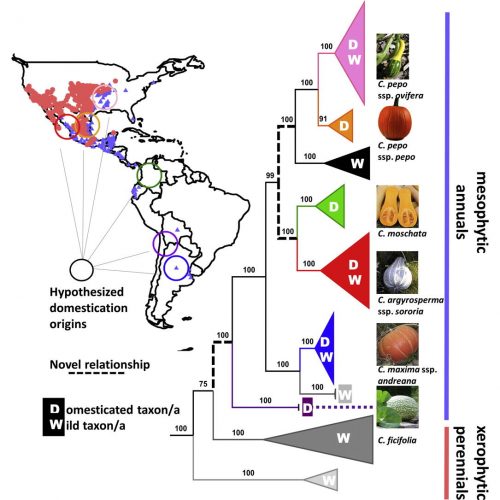
Kates, H. R., P. S. Soltis, and D. E. Soltis. 2017. Evolutionary and domestication history of Cucurbita (pumpkin and squash) species inferred from 44 nuclear loci. Molecular Phylogenetics and Evolution 111:98–109. [View on Publisher’s site]
Abstract
Phylogenetics can facilitate the study of plant domestication by resolving sister relationships between crops and their wild relatives, thereby identifying the ancestors of cultivated plants. Previous phylogenetic studies of the six Cucurbitacrop lineages (pumpkins and squashes) and their wild relatives suggest histories of deep coalescence that complicate uncovering the genetic origins of the six crop taxa. We investigated the evolution of wild and domesticated Cucurbita using the most comprehensive and robust molecular-based phylogeny for Cucurbita to date based on 44 loci derived from introns of single-copy nuclear genes. We discovered novel relationships among Cucurbitaspecies and recovered the first Cucurbita tree with well-supported resolution within species. Cucurbita comprises a clade of mesophytic annual species that includes all six crop taxa and a grade of xerophytic perennial species that represent the ancestral xerophytic habit of the genus. Based on phylogenetic resolution within-species we hypothesize that the magnitude of domestication bottlenecks varies among Cucurbita crop lineages. Our phylogeny clarifies how wild Cucurbita species are related to the domesticated taxa. We find close relationships between two wild species and crop lineages not previously identified. Expanded geographic sampling of key wild species is needed for improved understanding of the evolution of domesticated Cucurbita.